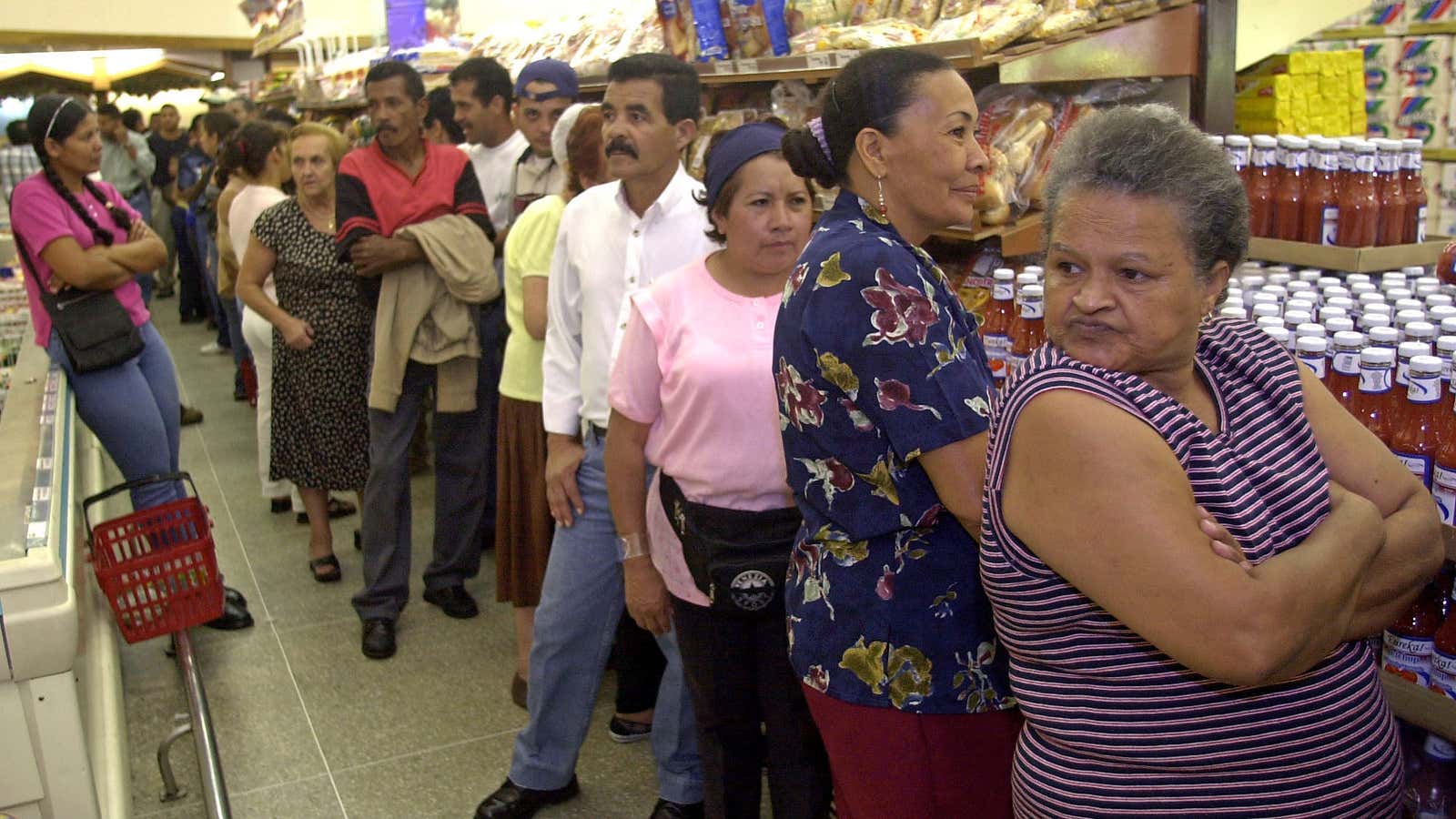The lines have never been worse.
In Venezuela, they’ve been around for years and begin in the wee hours—queues at supermarkets and department stores for basic goods like toilet paper and rice.
But this month, the lines have become longer and the waiting times have increased. People’s lives now revolve around standing in lines. They sleep on the streets to be the first in line to buy car batteries, laundry soap, tampons, and milk. They schedule their meals around being in line. Men and women of all ages now make their living by standing in line for others at 2am or earlier. They charge from $3 to $7 for each product they will buy on someone’s behalf.
Why so bad? Plunging oil prices only made inflation worse, and there’s a lack of foreign currency, among other issues.
“In terms of shortages, this is the worst I’ve seen,” says David Smilde, a senior fellow at the Washington Office on Latin America, a US think tank that studies the region, in an interview from Caracas. “And what’s different this time around is that at this point the people that are most affected are the poor. In 16 years of chavismo, for the most part, poor people’s outlook improved. Now they are encountering a serious decline in their standards of living.”
The situation has led to a rise in crime due to the exorbitant prices at which most goods are sold in the black market. The difference between official prices and market prices is currently more than 560%, according to a recent study. (Meat and poultry prices are well over 1,000% what they should be.)
On Jan. 9, an armed commando of four robbers stormed the Día a Día supermarket in La Vega, Caracas. They stole the money in the cash registers and fled on their motorcycles carrying as many tuna cans and bags of sugar and flour as they could carry. One day earlier, in the port city of Catia, an unknown number of assailants ransacked a truck and left the scene with 92 kg (203 lbs) of cold meats. Two days before, in the same city, 15 people stopped and looted two trucks filled with bread and other products from the Bimbo brand.
In response, the minister of interior relations, justice and peace, Carmen Meléndez, was forced to redirect police units to guard supermarket chains as well as the interminable lines that night and day are formed in front of them. In the state of Zulia, authorities were evaluating whether they should ban camping near supermarkets at night to curb crime. They were also considering a numbering system to prevent people from buying too many goods. Parents might have to show their baby’s birth certificates to be able to buy diapers.
Logically, the economic mess is also getting political. According to the government, the shortage is in part a result of a national campaign led by opposition leaders to upend the regime.
Indeed, Venezuela’s economic collapse has helped opposition leaders, who in the past few days have called for the ousting of Nicolás Maduro’s government.
“At the beginning of 2014, political change was urgent,” opposition leaders Leopoldo López, María Corina Machado and Antonio Ledezma said last week. “At the beginning of 2015, it is inevitable.”
Maduro, who was elected president in 2013 after Hugo Chávez’s death, will face legislative elections next year. But the population might not wait that long to demand change.
Venezuela’s economy has steadily failed with the decline of oil prices, which have fallen nearly 60% since June, when the price of a barrel peaked at $115. Oil accounts for nearly 96% of the country’s income, and as of 2015 they would need prices to be at $122 per barrel to balance their fiscal accounts, according to Asdrúbal Oliveros, director of the consulting firm Ecoanalítica. In a nutshell, the country is broke.
To save it, Maduro, who has been on an international tour to gather funds in the past few weeks, will be forced to raise the price of gasoline, devaluate the currency, and turn to the private sector—three wildly unpopular moves.
Not surprisingly, then, Maduro’s popularity is barely over 20% and for the first time in decades the opposition seems to be gaining ground on Chávez’s heir.
“This thing that they once called a revolution is over,” said the governor of the state of Miranda and former presidential candidate Henrique Capriles. “Venezuela is not terminally ill, what’s terminally ill is this government and their project.”
